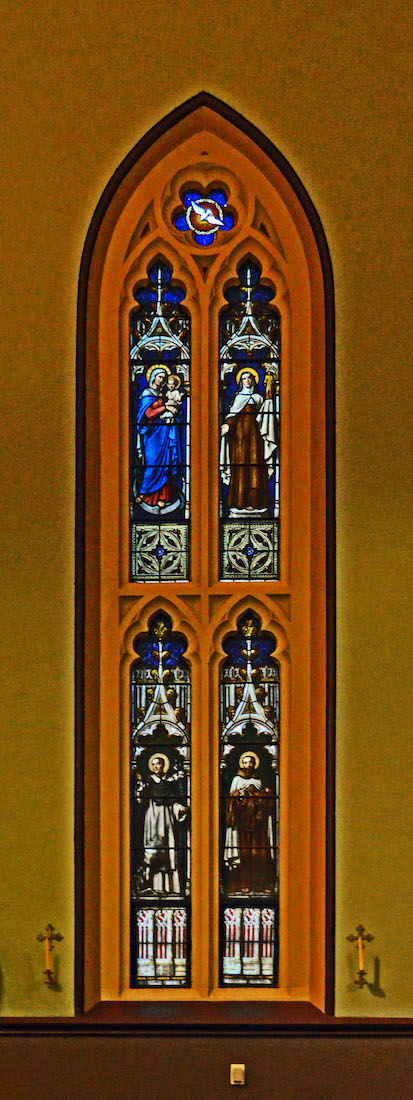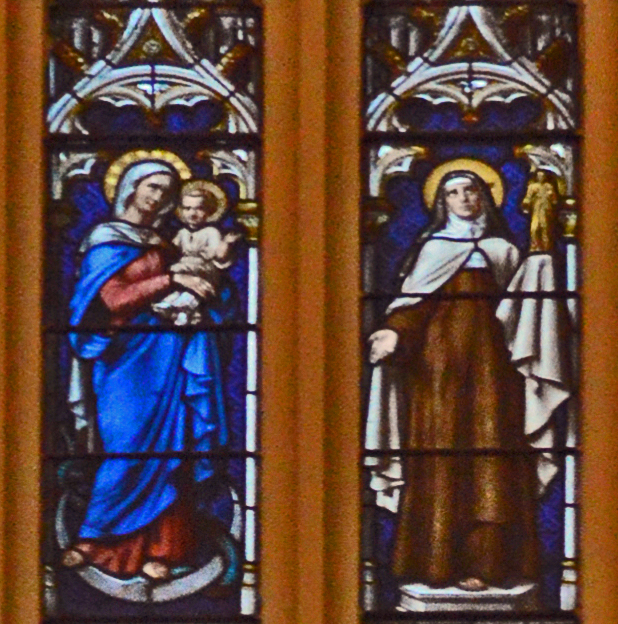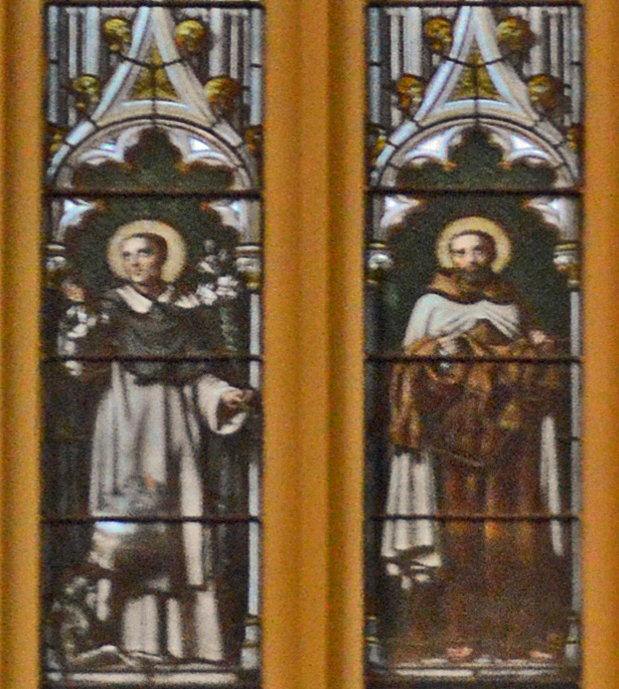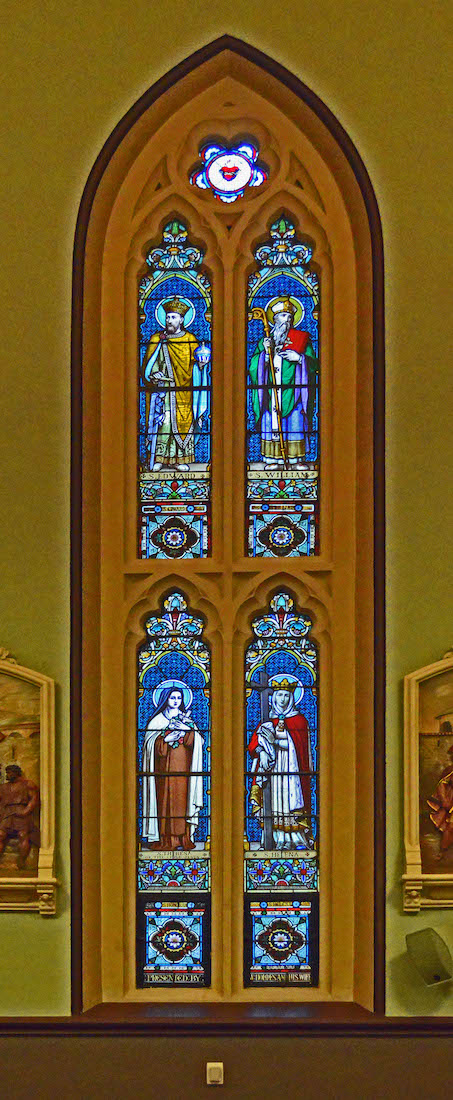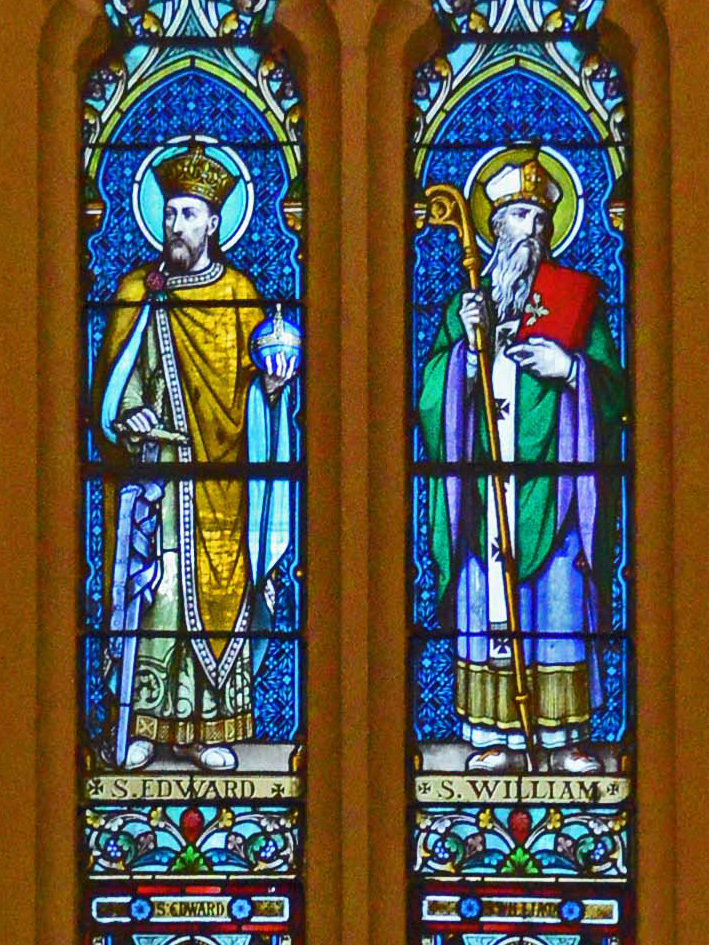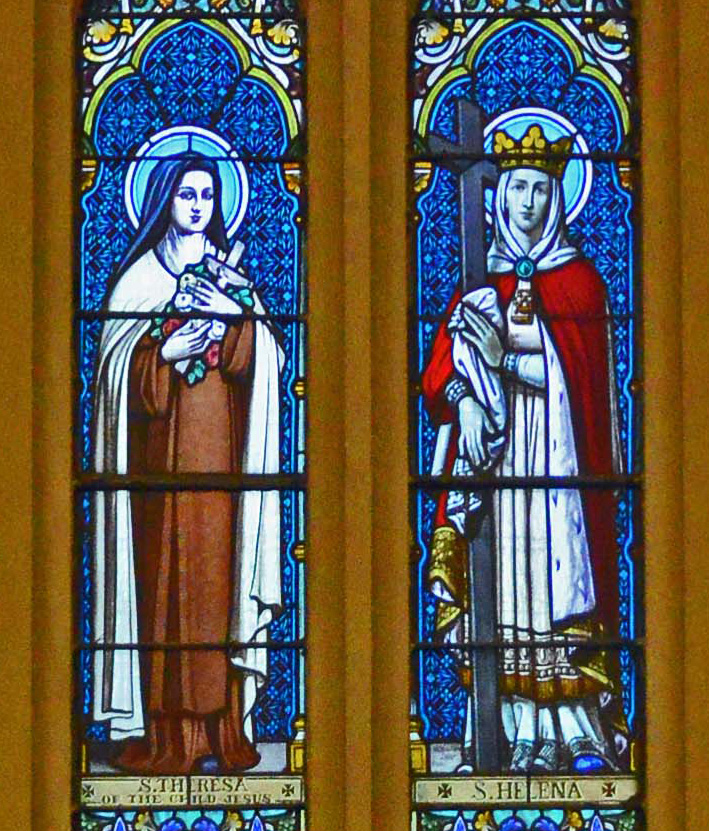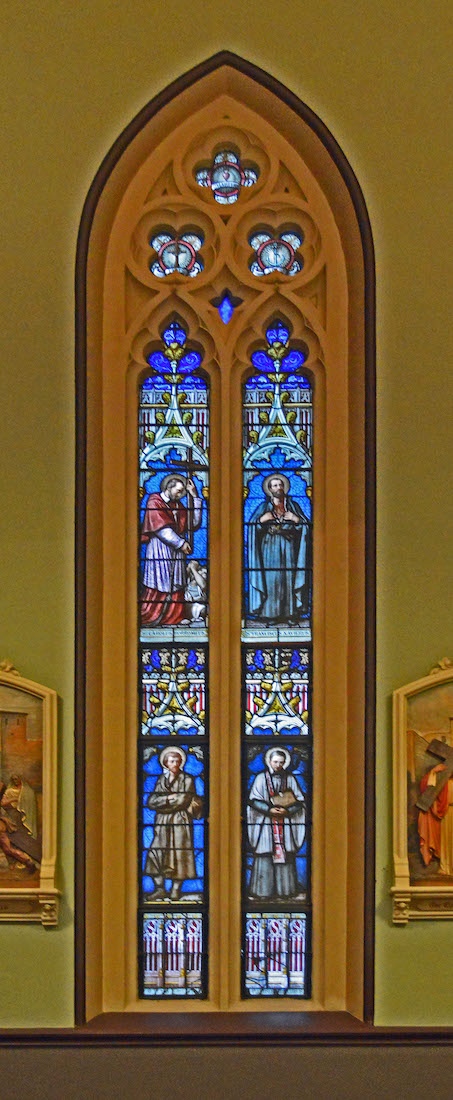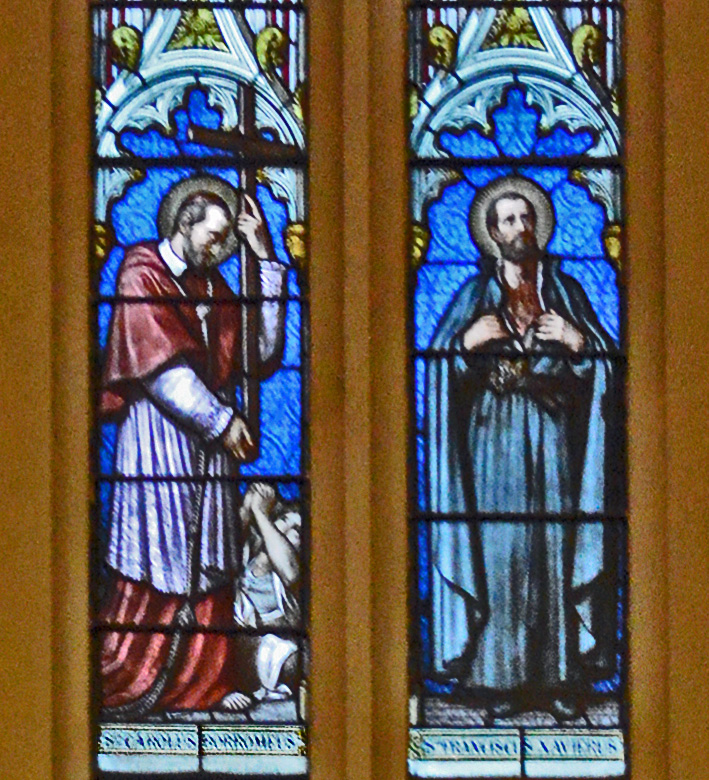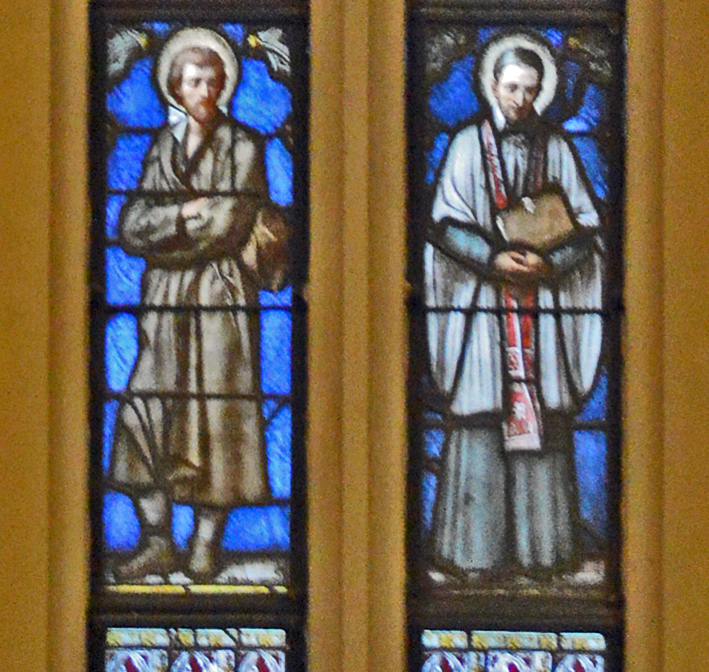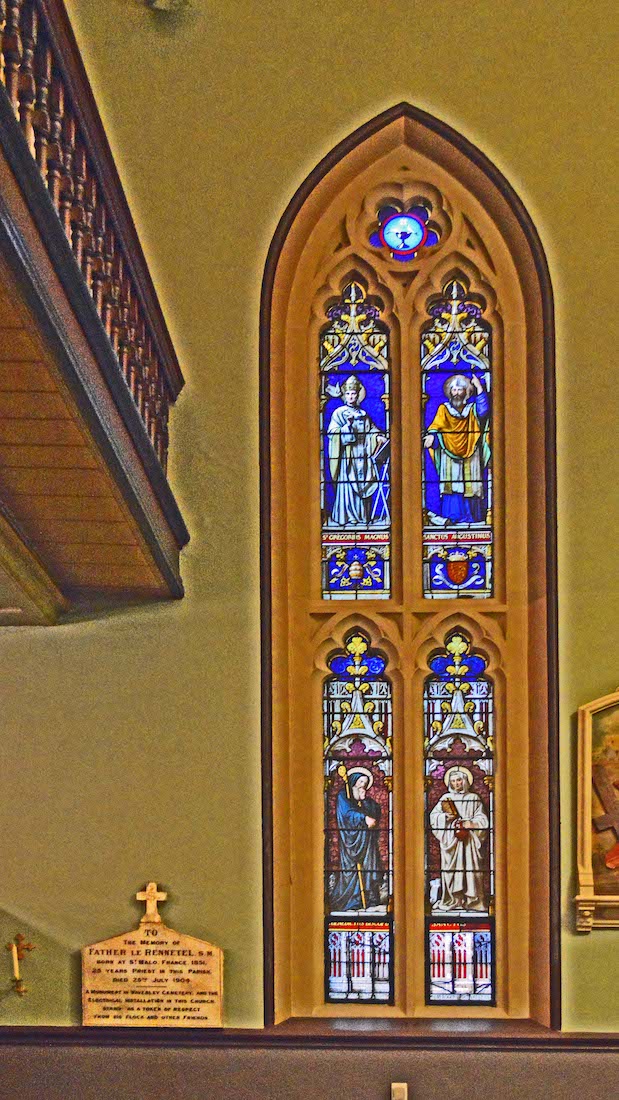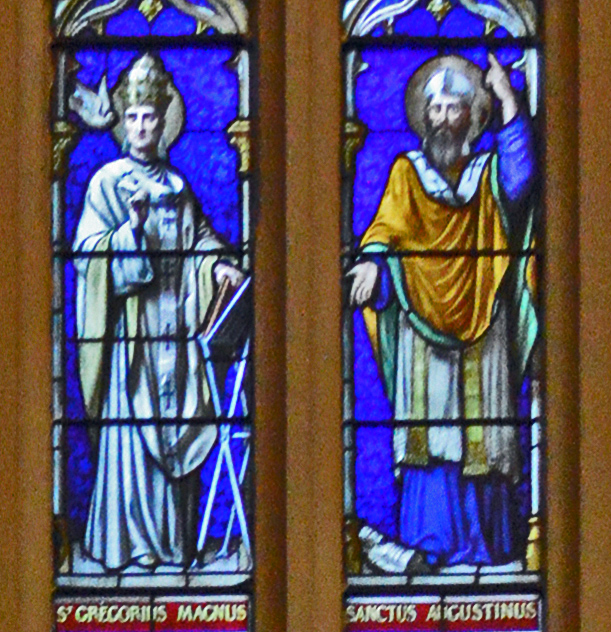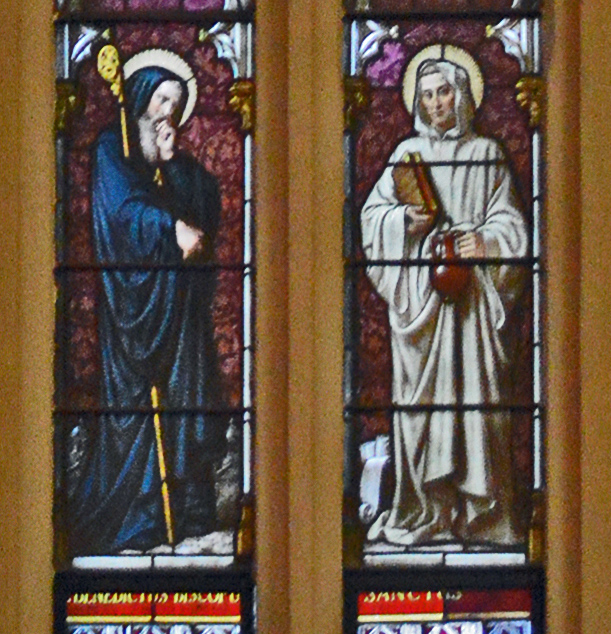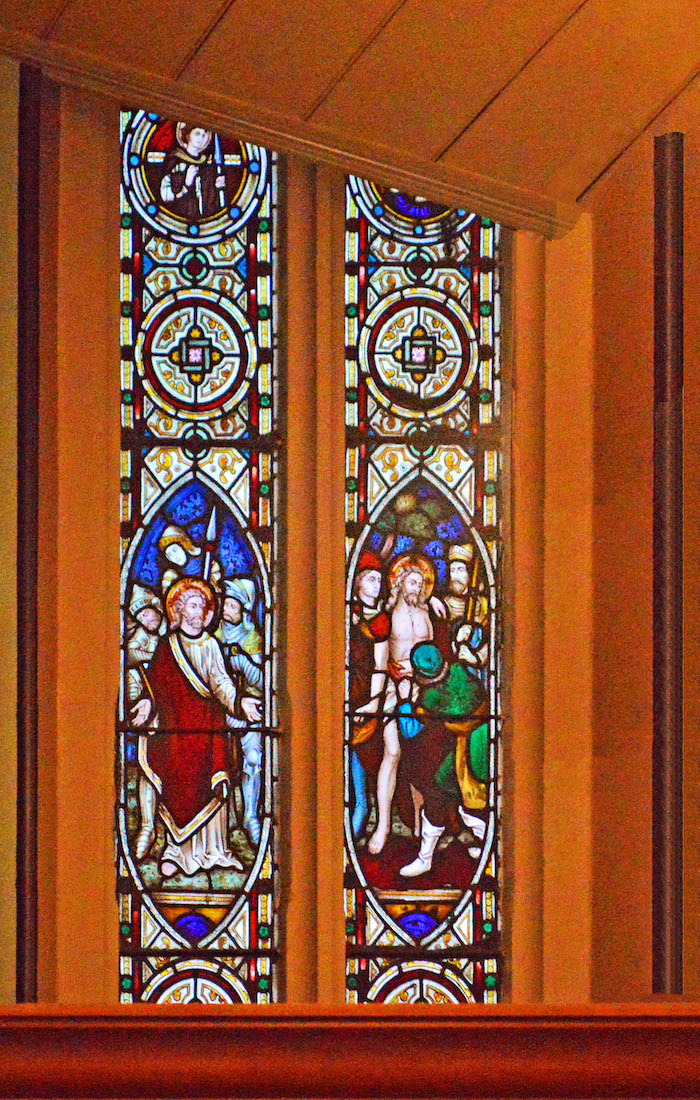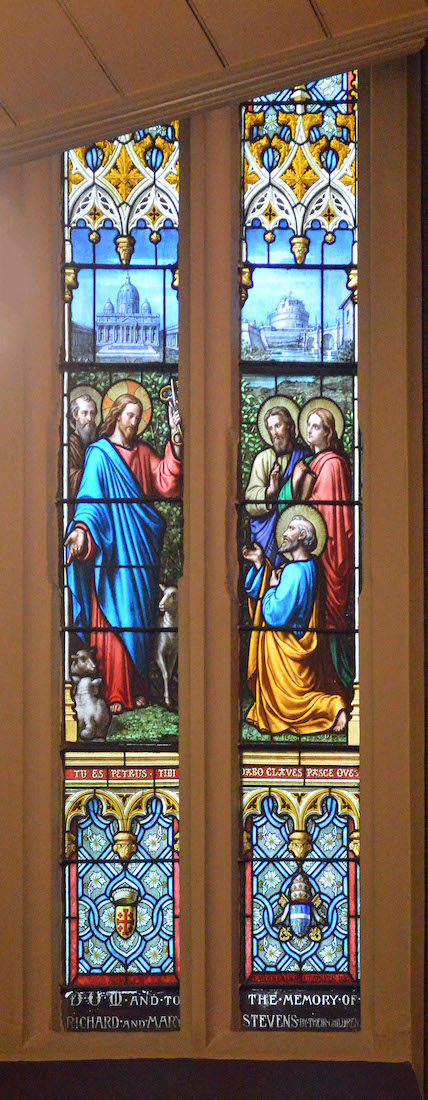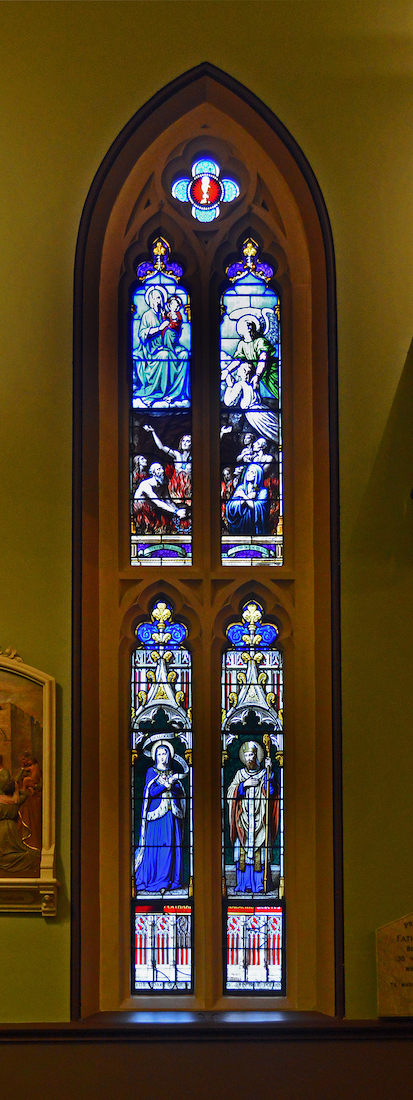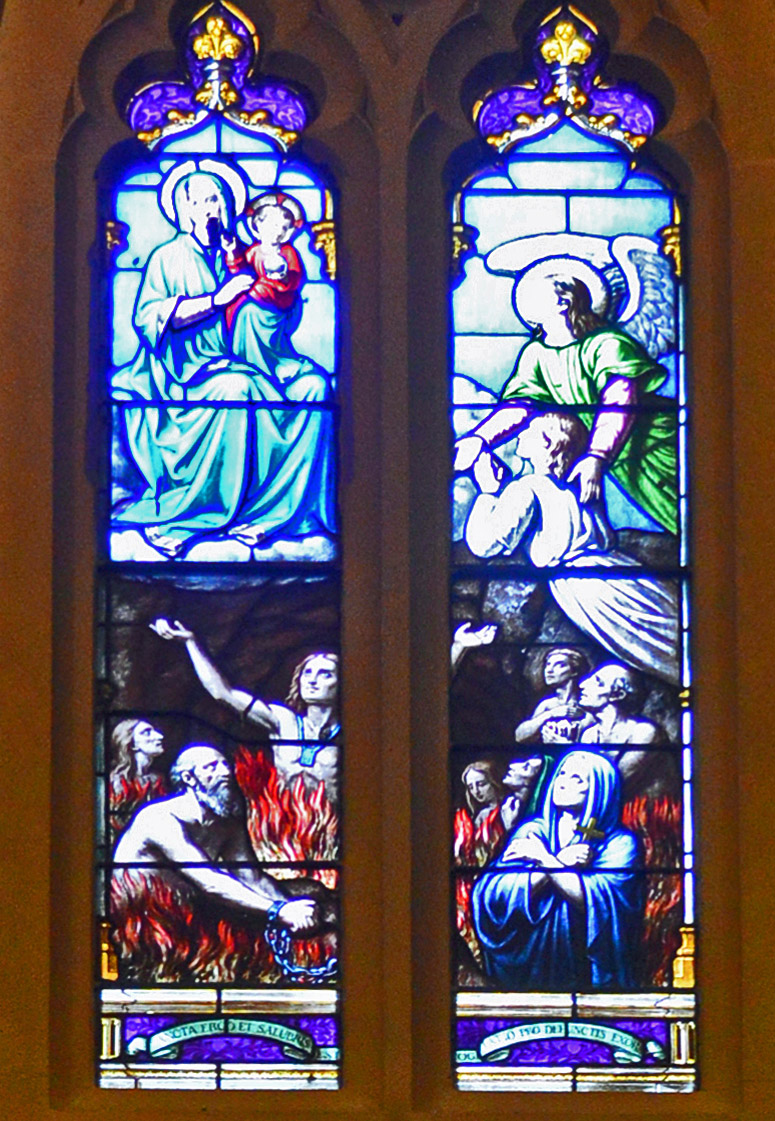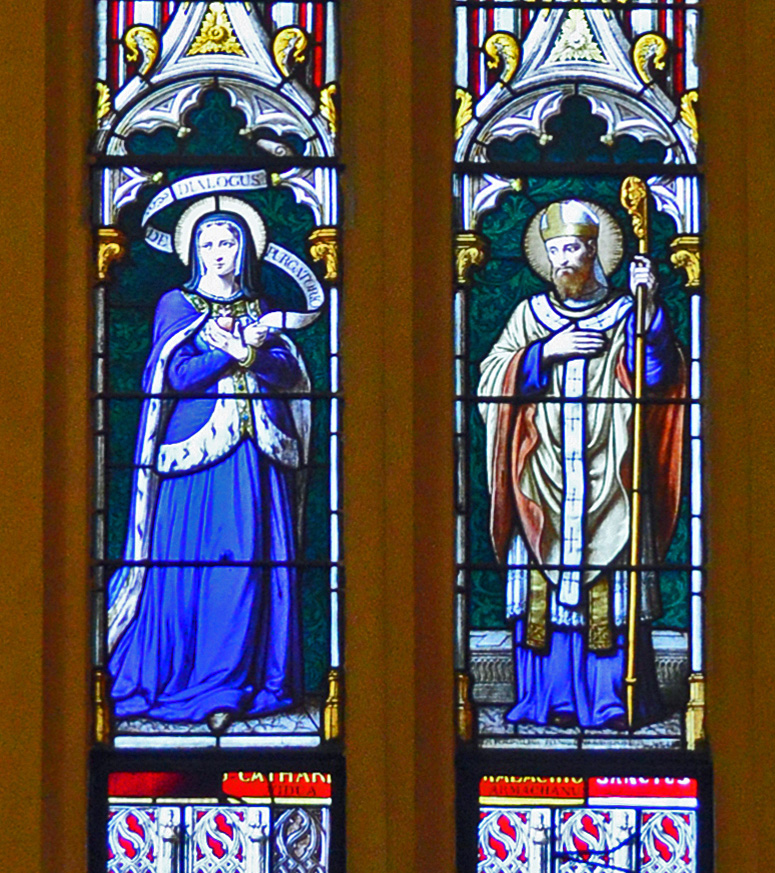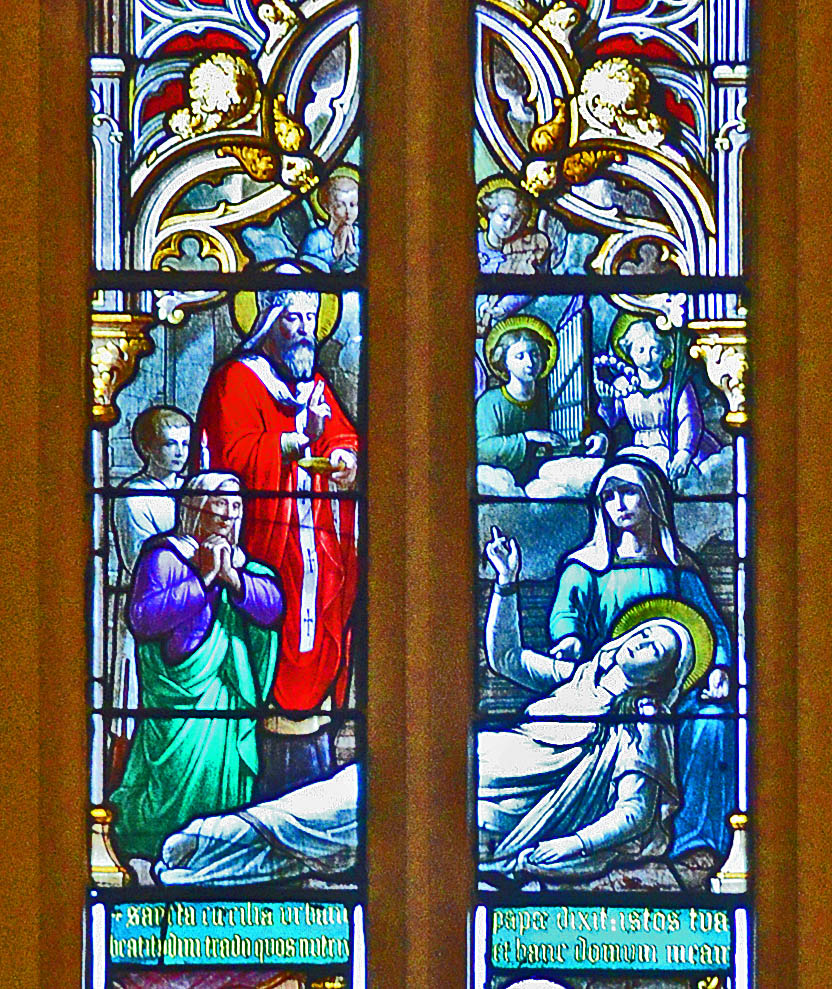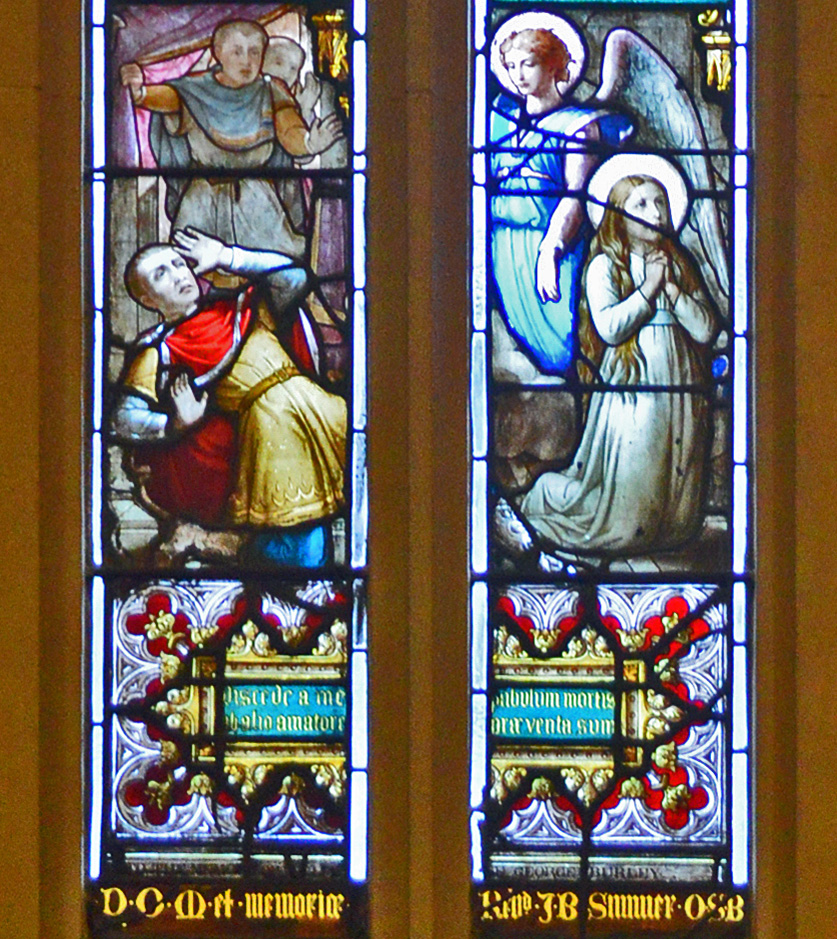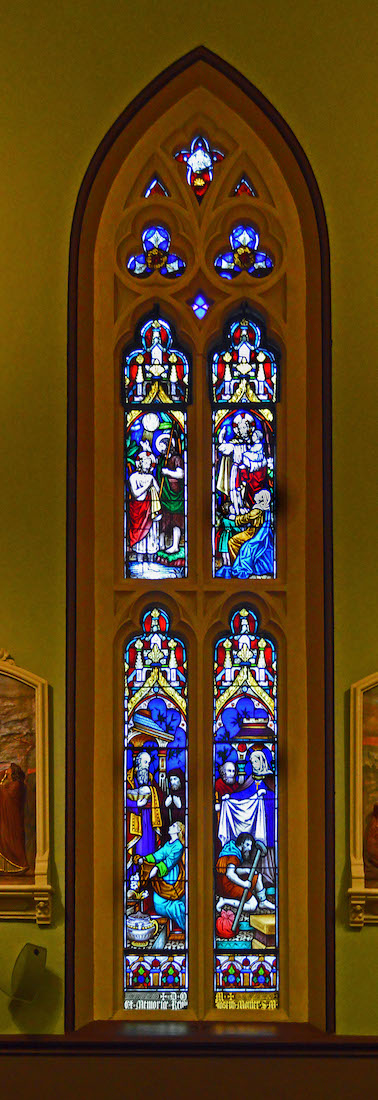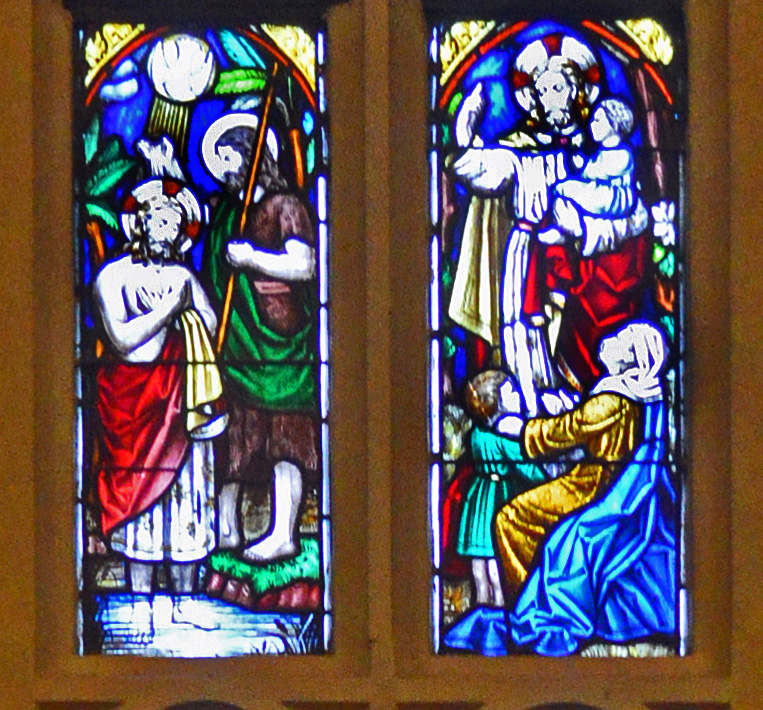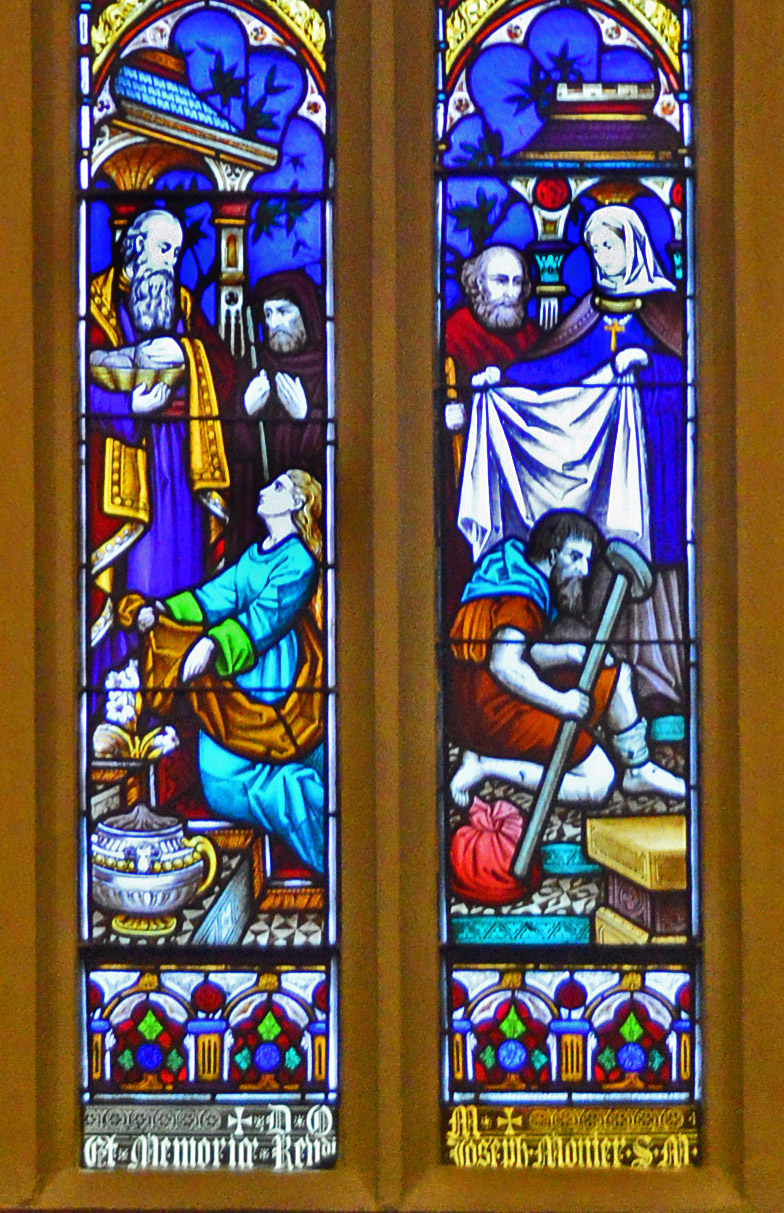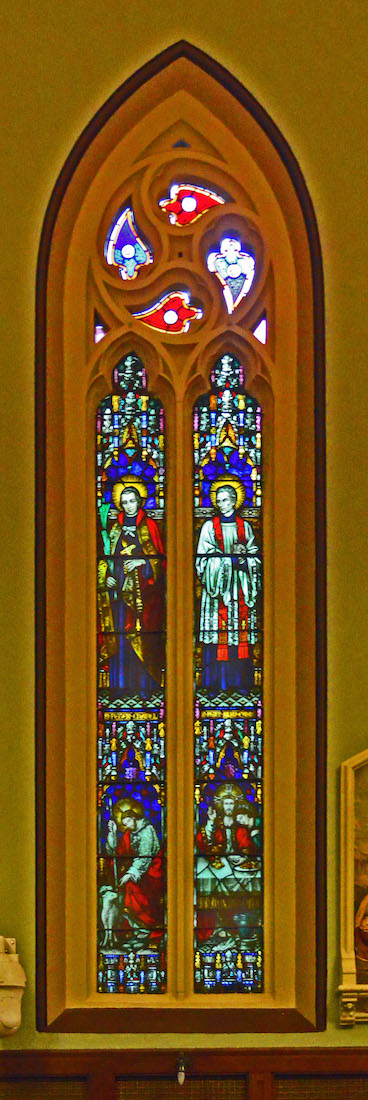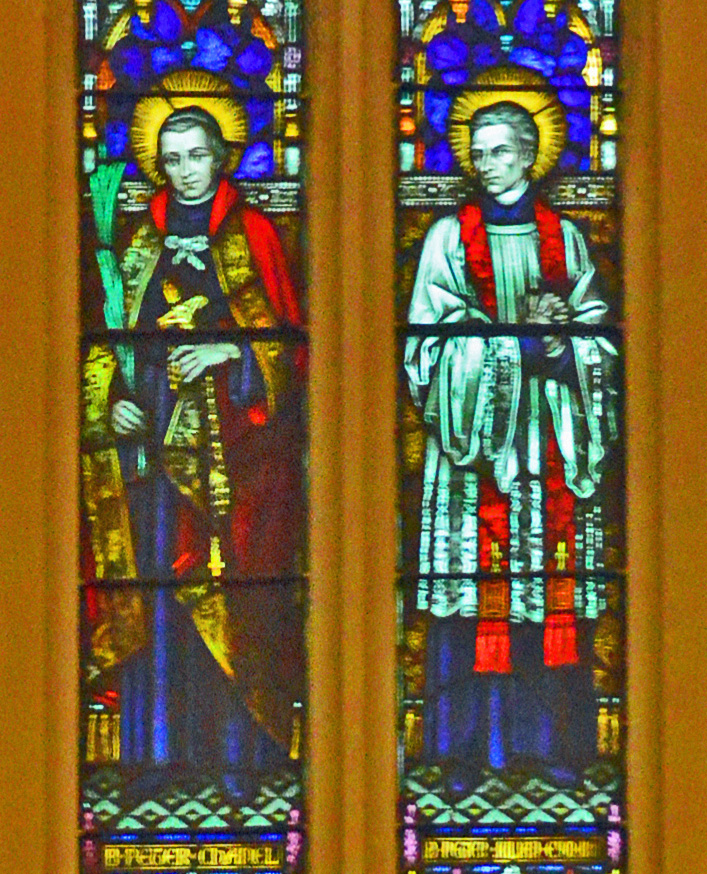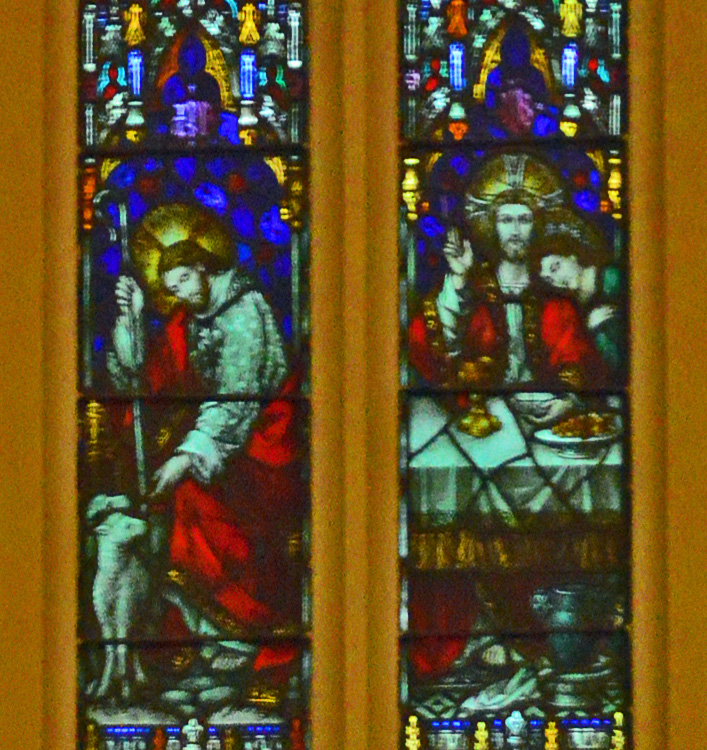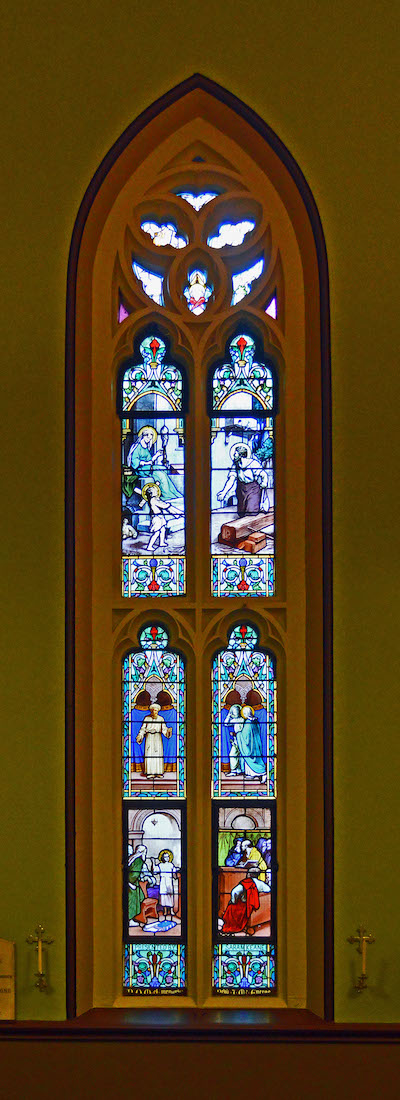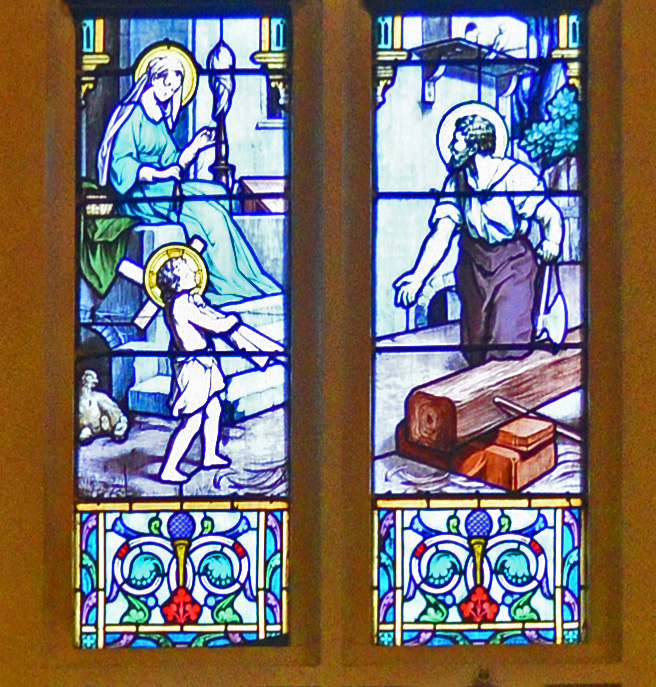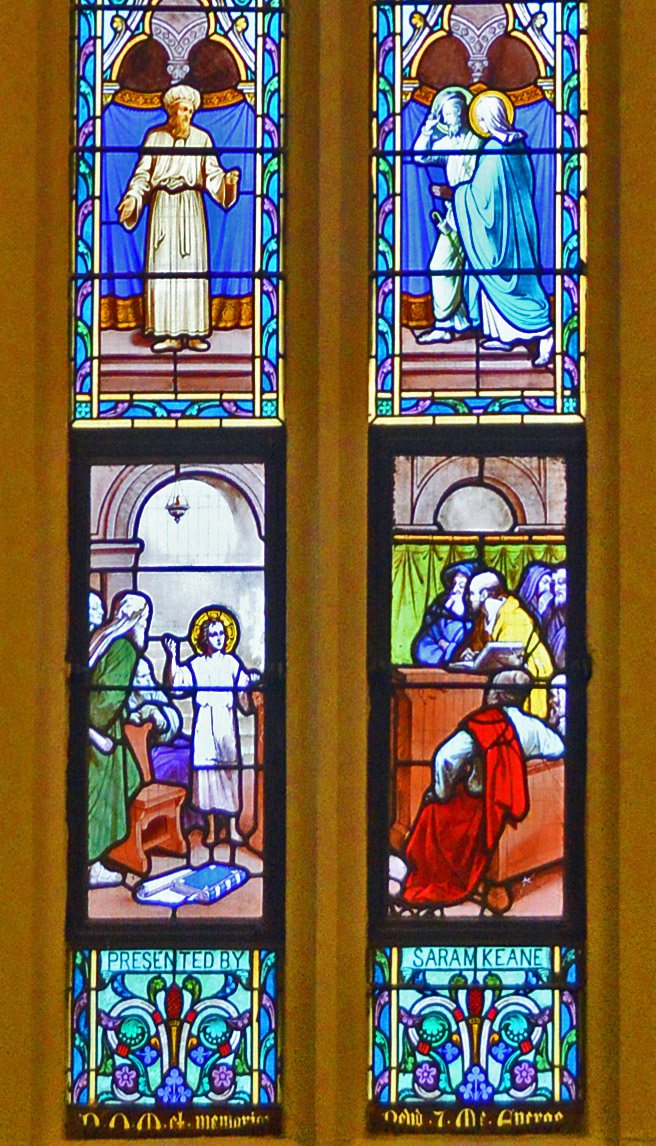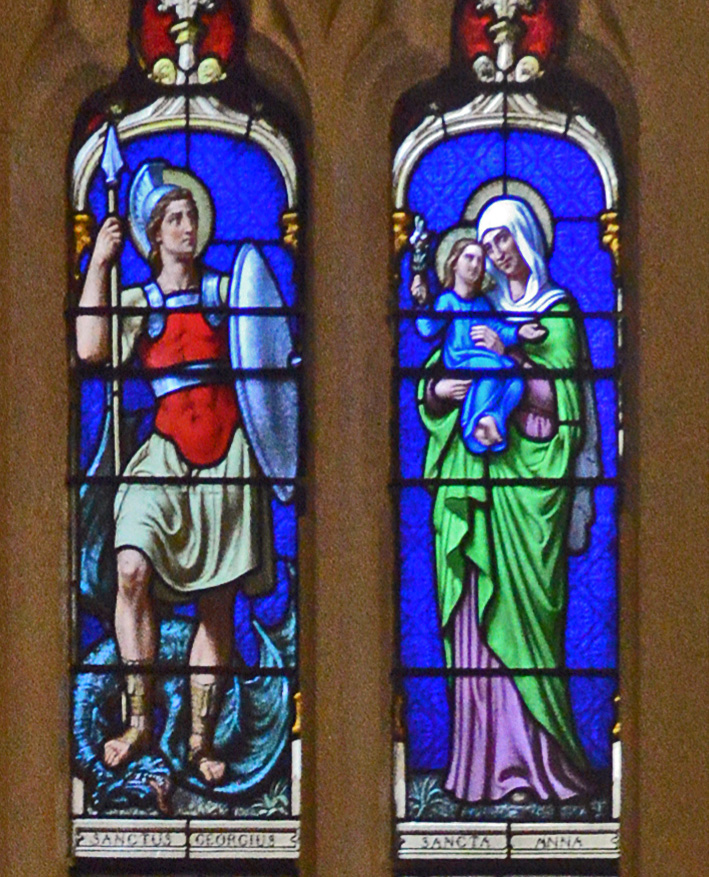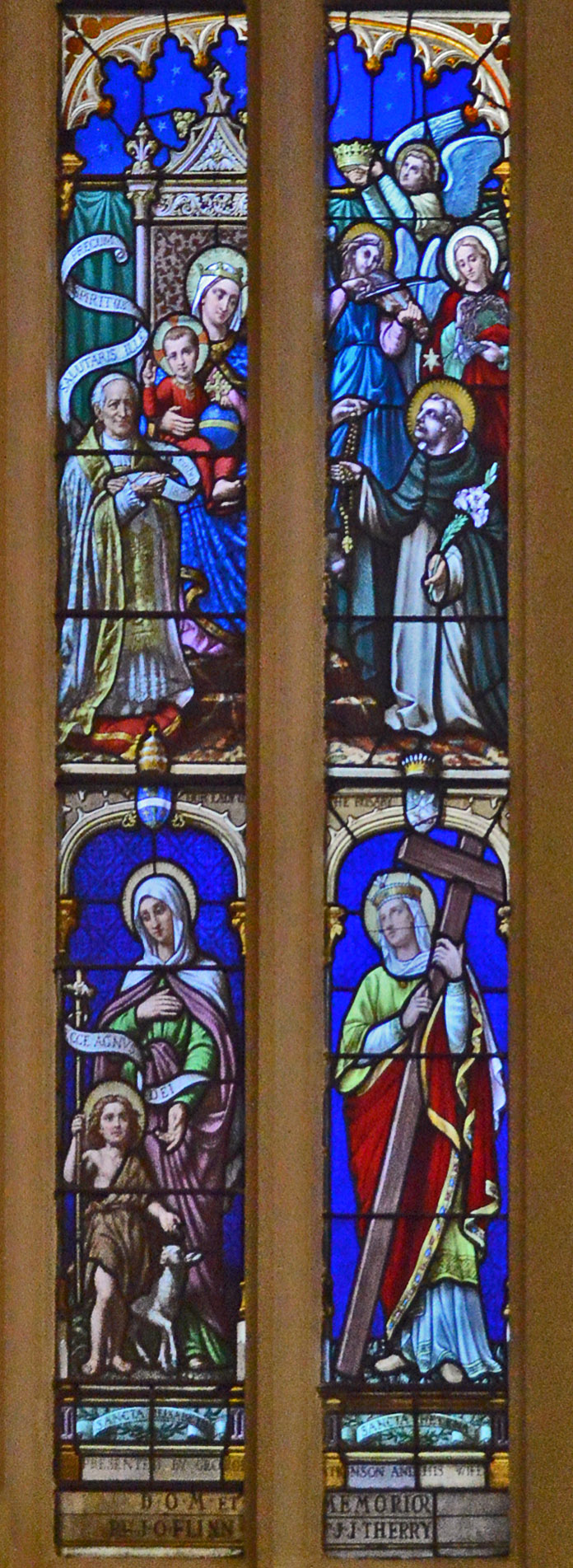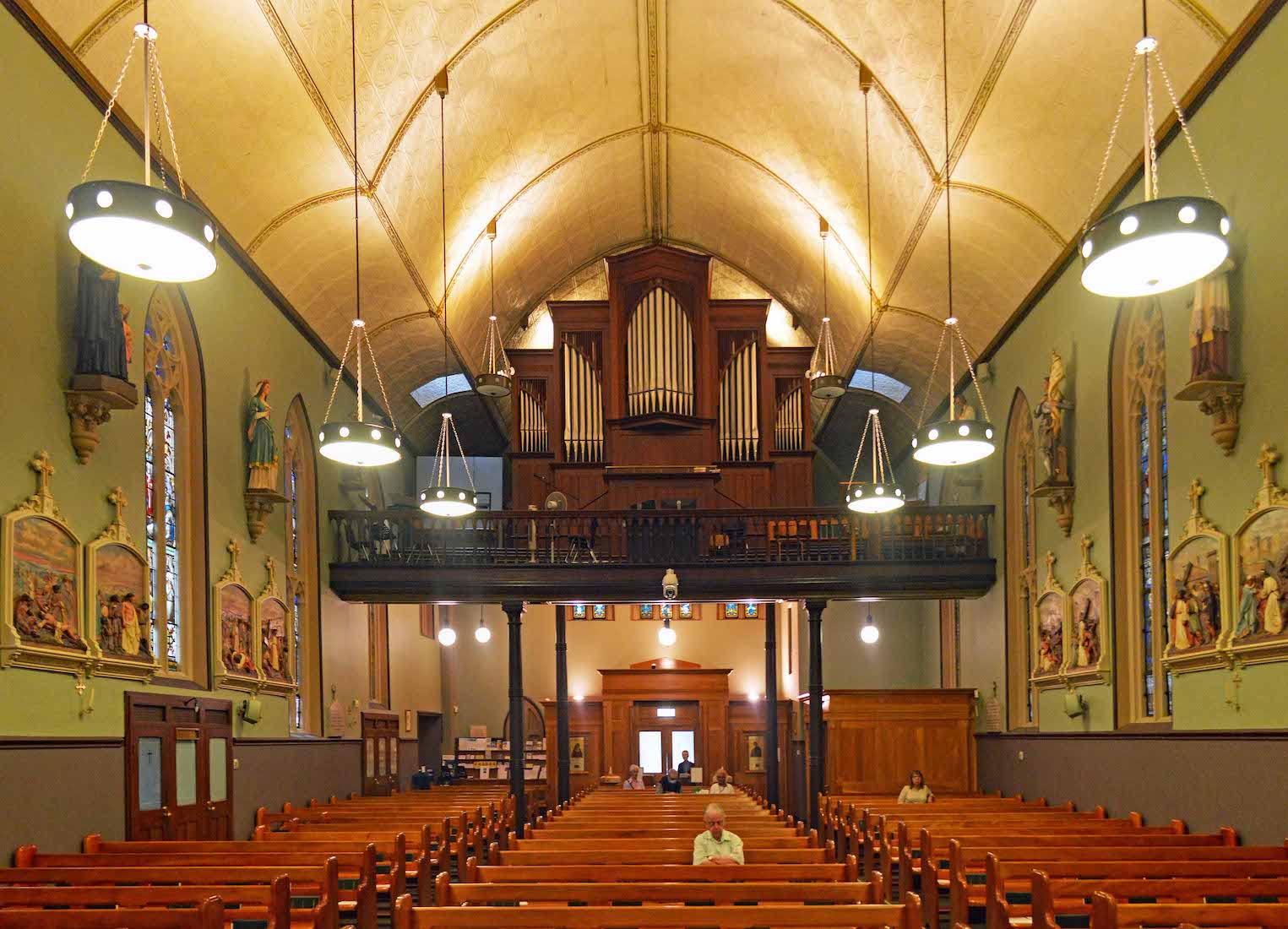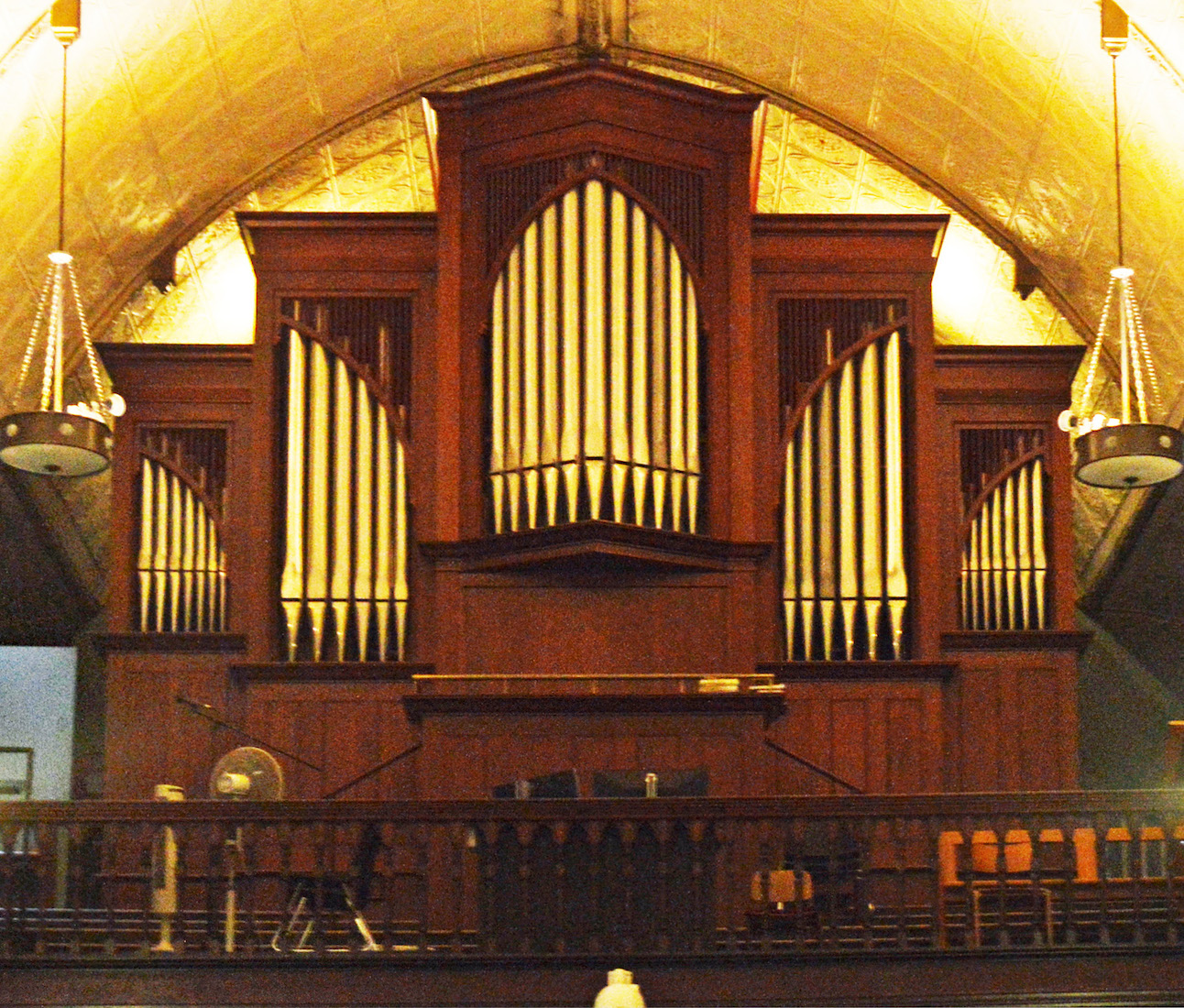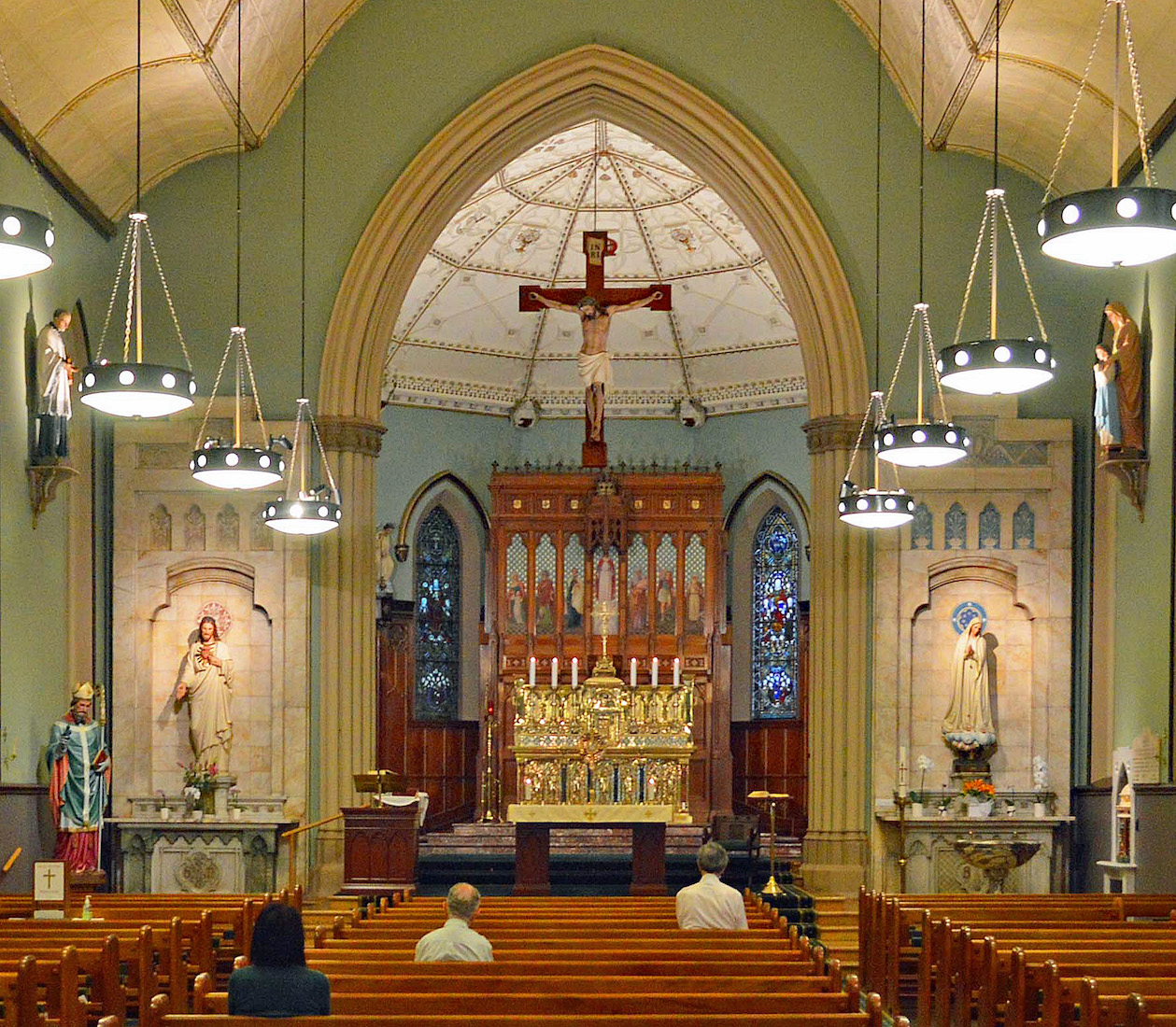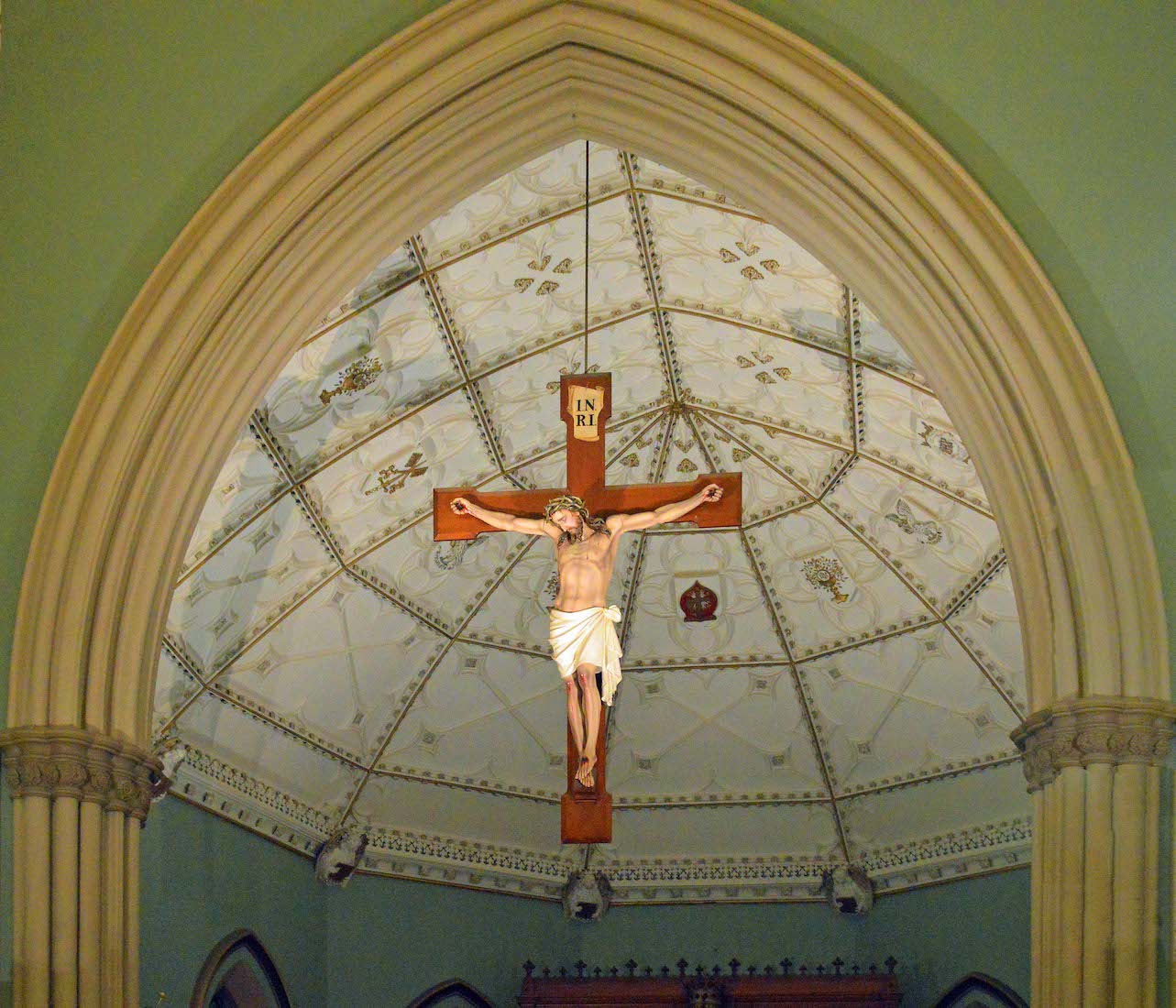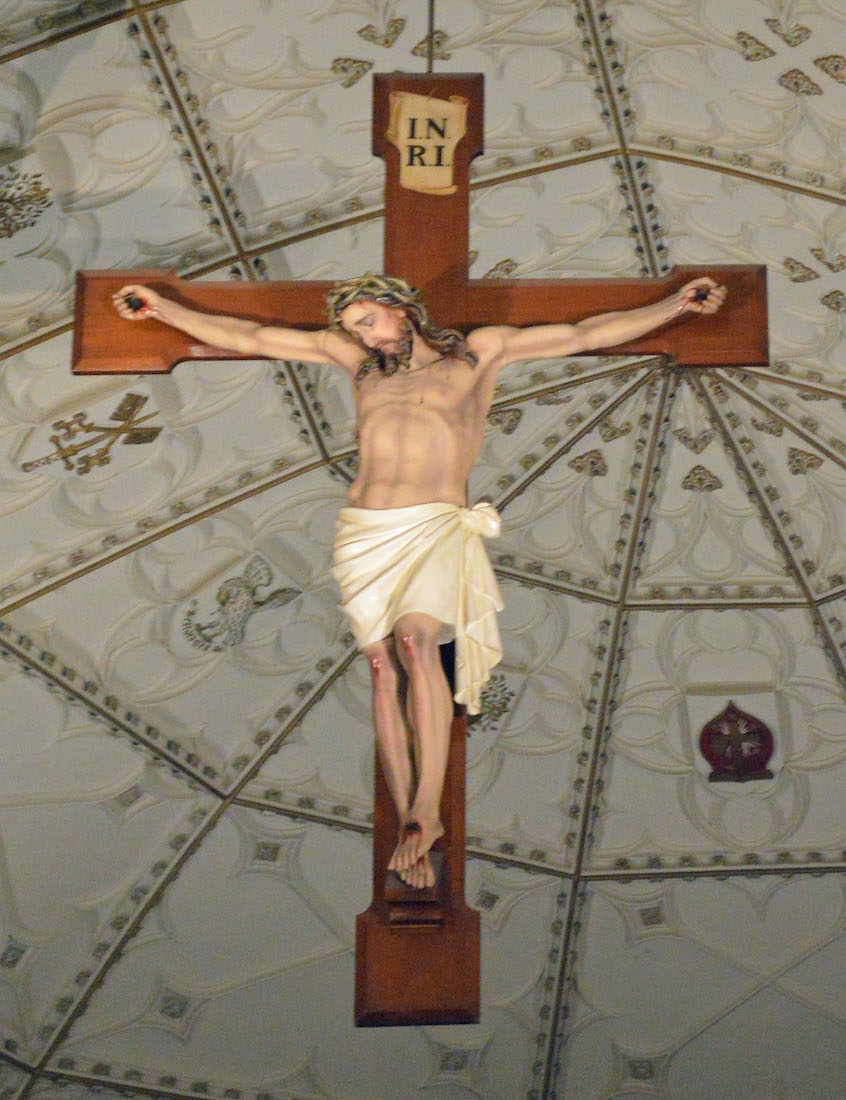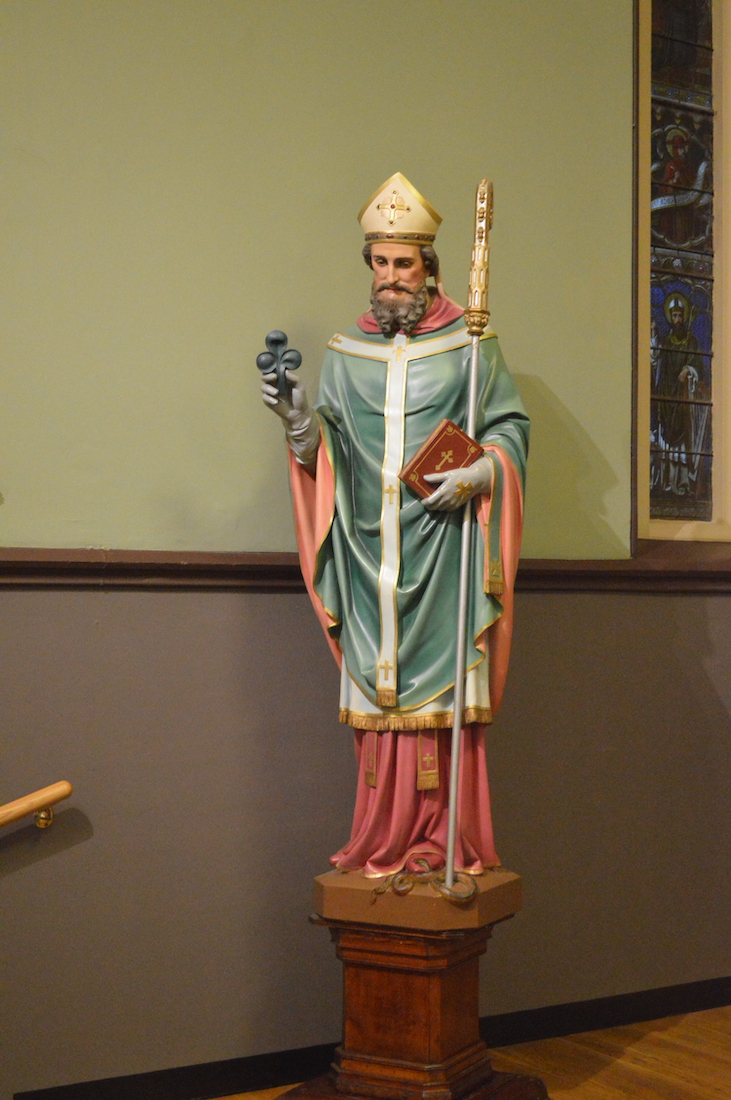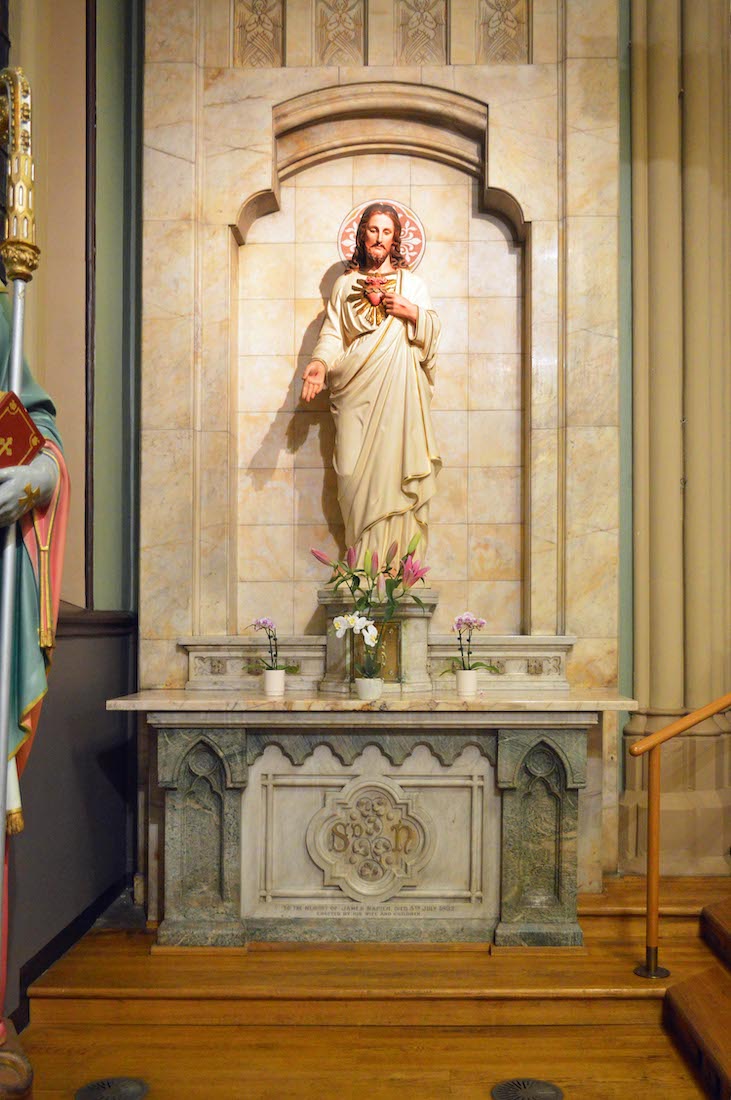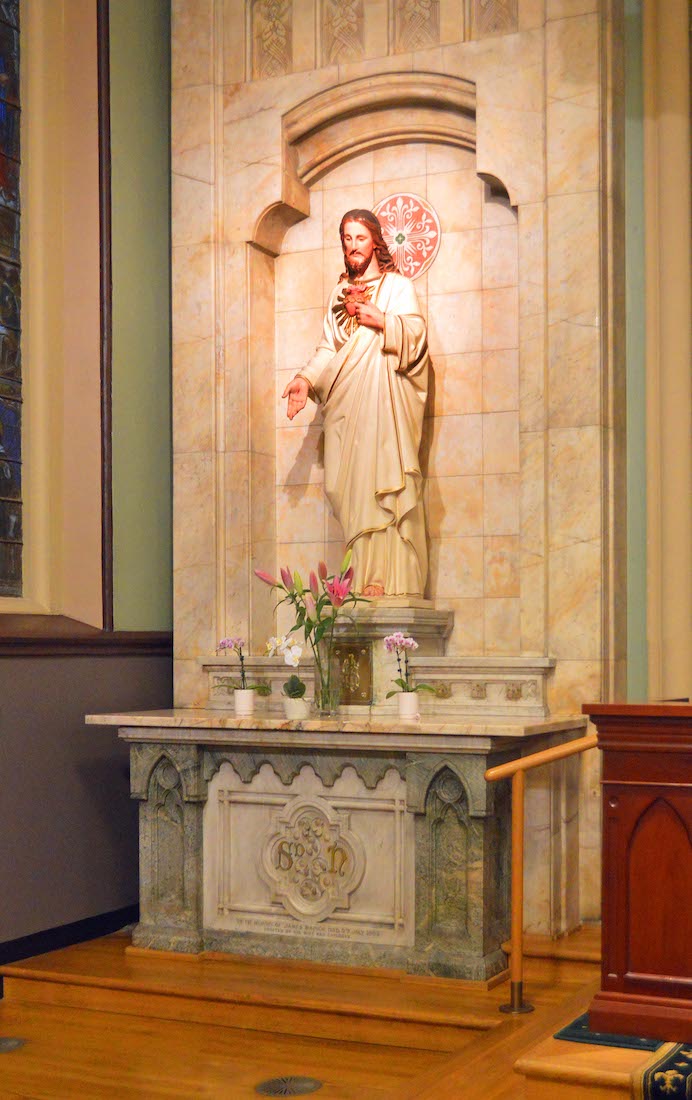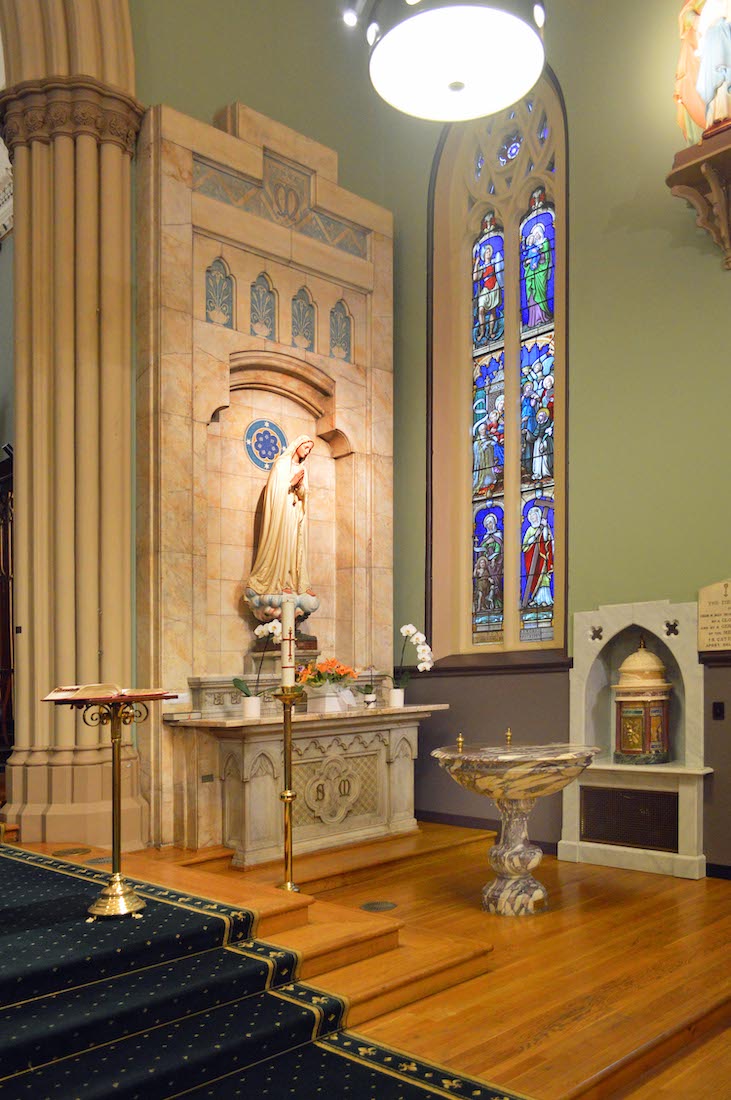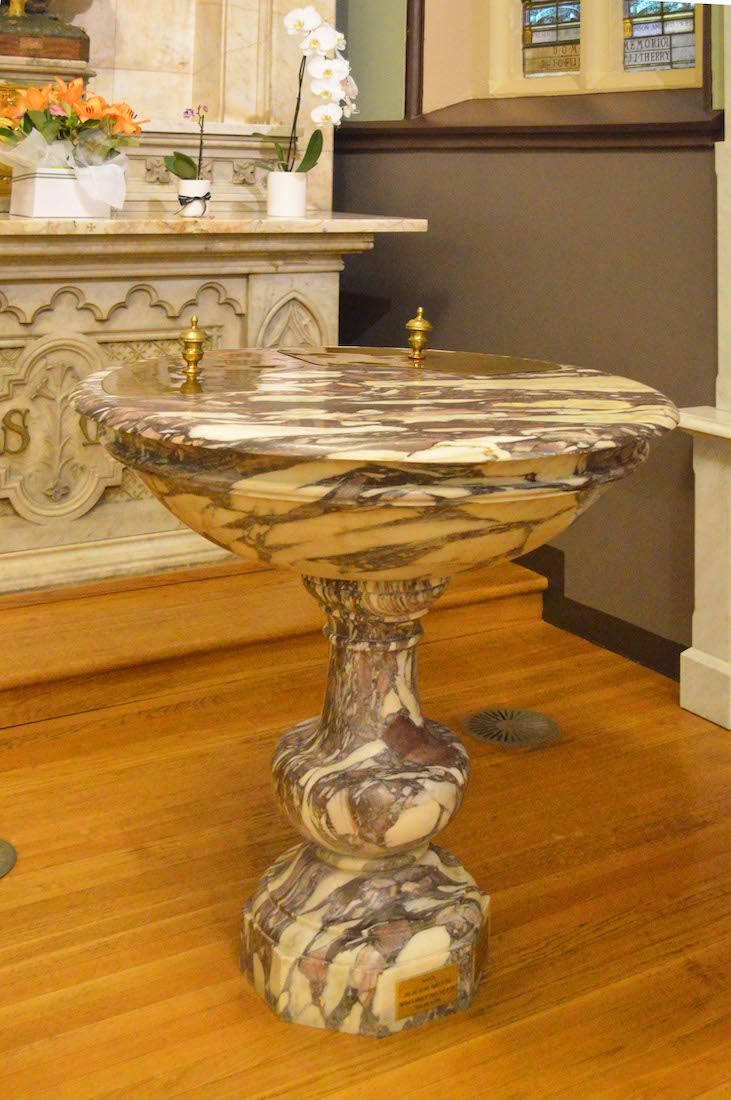22. NORTH WINDOW 5
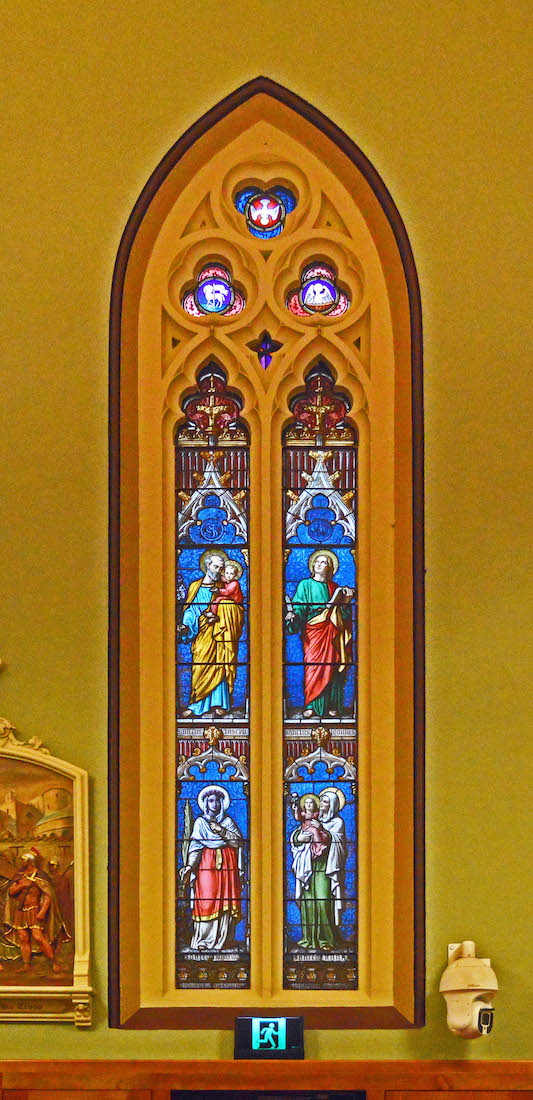
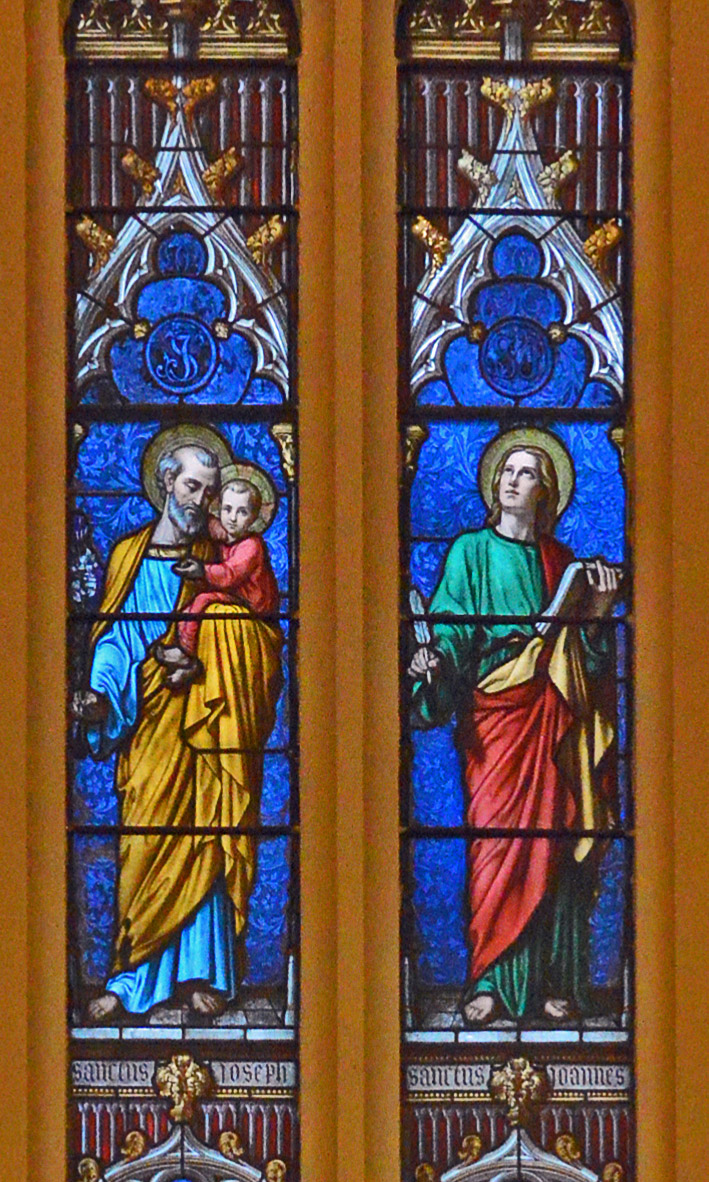
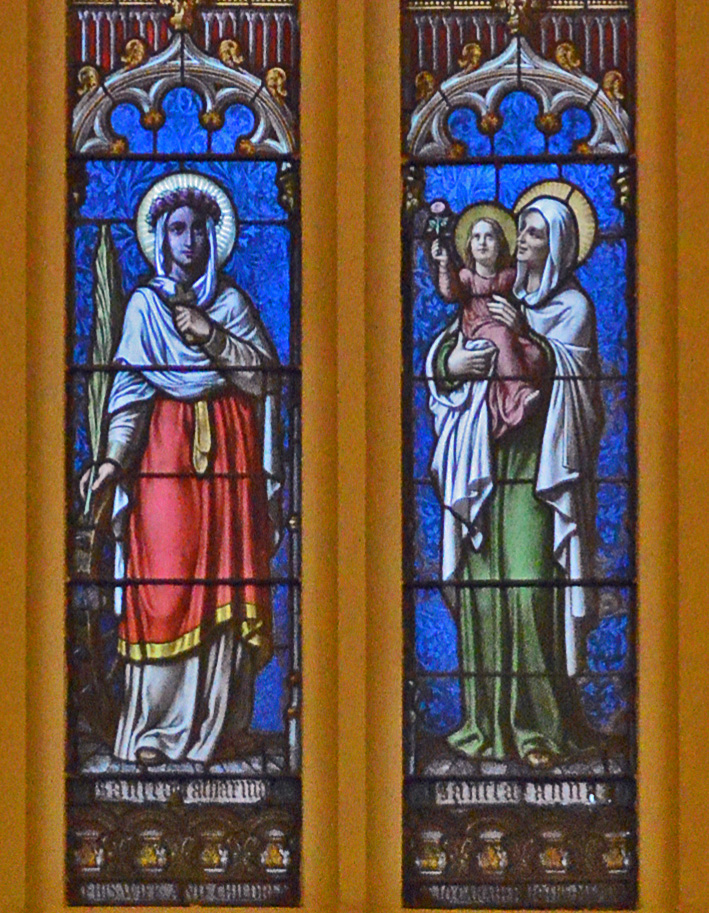
The next window contains some helpful labels. Here we have four panels depicting St Joseph, St John, St Katharine, and St Anna. Anna is shown holding her young daughter Mary, and Katharine stands by her infamous wheel.
23. NORTH WINDOW 4
Again, the saints pictured in this window have labels. The four panels portray St Edward, St William, St Theresa (of the Child Jesus) and St Helena. Saint Helena, also known as Saint Helen (ca. 246/50 – ca. 330) was the consort of Emperor Constantius, and the mother of Emperor Constantine I. She is traditionally credited with finding the relics of the True Cross.
24. NORTH WINDOW 3
Again in this window there are four panels, each depicting a saint. The text under the top left panel reads St Carolus Borromeus (= Charles Borromeo) who lived 1538 – 1584, and introduced many reforms to the Catholic Church. ••• The second panel shows St Francis Xavier (1506 – 1552). Francis Xavier, SJ, venerated as Saint Francis Xavier, was a Navarrese Catholic missionary and saint who was a co-founder of the Society of Jesus. ••• ... ••• ... .
25. NORTH WINDOW 2
The next North window is adjacent to the balcony rail. Again there are four panels showing various saints. These are: St Gregory the Great, St Augustine, ... , ... .
26. NORTH WINDOW 1
The Westernmost window along the North wall is half obscured by the balcony. The two lower visible panels show scenes of Jesus on his way to the Crucifixion.
27. SOUTH WINDOW 1
We move across under the West balcony to the South side of the Church. The visible portion of the Westernmost window shows Jesus giving Peter the Keys of the Kingdom with the words, ‘You are Peter [petros = Rock], and on this rock I will build my church’ (Matthew 16:18). At the top are pictures of St Peter’s and Castel Sant’Angelo in Rome. The window is given in memory of Richard and Mary Stevens.
28. SOUTH WINDOW 2
We continue to investigate the Nave windows, moving forward along the South wall. The second window has a top section illustrating heaven and hell, or perhaps heaven and purgatory. At top Mary holds the Christ Child and is worshipped by angels. Below, the unsaved are subjected to an uncomfortable alternative. The two panels at the bottom of the window portray saints. The labels are obscured but contain the words ‘Vidua’ (St Oda?) and ‘Armachanu’ (Diocese of Dublin?).
29. SOUTH WINDOW 3
This next window has two scenes. At top ... . And below, ... .
30. SOUTH WINDOW 4
The fourth window on the South side has four panels. The top two show Jesus being baptised, and then Jesus with the children. The bottom panels show ... , and ... .
31. SOUTH WINDOW 5
So to the fifth window along the South wall –f our panels again. The top two panels depict the saints ... , and ... . The bottom two panels show familiar scenes: Jesus as the Good Shepherd, and Jesus at The Last Supper.
32. SOUTH WINDOW 6
We come to the sixth window. The upper two windows show the Holy Family happily occupied in Joseph’s workshop. Of course the young Jesus is carrying a wooden cross! The four panels at the bottom of the window illustrate the story of Joseph and Mary losing Jesus and returning to Jerusalem to find him teaching in the Temple (Luke 2:41–52).
33. SOUTH WINDOW 7
The final window on the North side is by the shrine to Our Lady. This window has six panels, portraying various individuals and groups. We see here: •• St George; •• St Anna (with a young Mary); •• (top) a joyous scene around the crowned Mary with Child Jesus; •• St Agnes with St Elizabeth Ann Seton(?) ; •• St Helen(a), mother of Constantine the Great.
34. NAVE GALLERY, ORGAN
We now stand at the front of the nave. Looking back we can view the Western gallery and the Church’s pipe organ. This Fratelli Ruffatti organ is the third organ to be installed in St Patrick’s Church, the first being a Gray and Davison of 1848 and the second a larger instrument by Charles Anneessens of 1895.
35. ORGAN PIPES
The Ruffatti organ was the final stage in a refurbishment of St Patrick’s Church which began in 1999.
36. FRONT NAVE
We now turn to face the sanctuary. Above us is the rood cross. To our left is a welcoming St Patrick with a Sacred Heart shrine behind. To our right is a shrine to the Virgin Mary, and close by, a baptismal font and tabernacle.. At centre we have nave altar, pulpit and lectern, and then the sanctuary behind.
37. ROOD CROSS
The rood cross is a large crucifix which hangs above the entry to the sanctuary. Traditionally it was often part of the rood screen which separated nave from sanctuary, and often includes the figures of Mary the Mother of Jesus and the disciple John at its base.
38. WELCOMING SAINT PATRICK
Appropriately for this Church the figure of patron saint, St Patrick, stands in a prominent position. As here, he is often depicted with a snake underfoot, alluding to a legend that Patrick rid Ireland of snakes during the fifth century AD.
39. SACRED HEART SHRINE
Just beyond St Patrick is a shrine to the Sacred Heart. We have already mentioned the nun Margaret Mary Alacoque and her vision about the Sacred Heart (#20). The symbolism of the Sacred Heart shows a heart that is often surrounded by light, depicting the divine light which shines from the Heart of Jesus. There is a wound in the Heart where the lance was thrust into the side of Jesus on the Cross. The Heart is surrounded by the crown of thorns, showing how His Heart is wounded by our sins, and is surmounted by a cross and flames of fire, symbolising the transformative power of God’s love for us.
40. OUR LADY SHRINE, FONT
In the Southeast corner of the nave is another shrine, a shrine to Our Lady. Close by, and not entirely related, is a baptismal font, and a tabernacle set in a wall niche. It seems that the font would be more fittingly placed in the little side chapel near the entry, as the rite of baptism speaks of entry into Christ and the Church. However, it would then be difficult to incorporate baptism into a worship service.


